

Baby Warukyure: Nice Days
Japan 2024
Genre:
Action, Comedy
Director:
Yugo Sakamoto
Cast:
Akari Takaishi
Saori Izawa
Sosuke Ikematsu
Atsuko Maeda
Mondo Otani
Atomu Mizuishi
Tomo Nakai
Kaibashira
Karuma

Baby Assassins - Nice Days
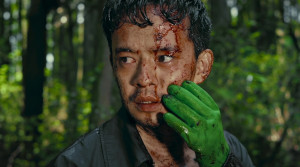
Story: Chisato (Akari Takaishi) and Mahiro (Saori Izawa) have completed their last contract killing faster than planned. So, they're just taking a little vacation and Mahiro's birthday is coming up too. But they still have a small job to do. Actually, it's just routine work, but when they stand in front of their victim Matsuura (Kaibashira), he is about to be killed by the freelance assassin Kaede Fuyumura (Sosuke Ikematsu). For him it is his 150th contract killing and so he is anything but happy that his anniversary is ruined. During the ensuing confrontation between the professional killers, the victim manages to escape. Fuyumura disappears too, and so Chisato and Mahiro have to leave without having achieved anything. And the Assassin's Guild is far from pleased. They send the tough Iruka Minami (Atsuko Maeda) and Riku Nanase (Mondo Otani) to make sure that the job gets done. Iruka wants the two girls to complete their mission, but first they have to take out Fuyumura. She and Riku support the two, but it won't be an easy task; Mahiro even has doubts that they will get out of the matter alive, because last time, they were clearly inferior to the killer ...




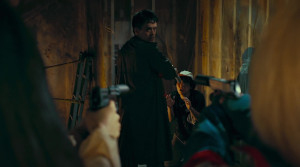
Review: It's strange that despite the tiny disappointment of "Baby Assassins 2", I had to see the next installment right away. The reason for this is for one, the outstandingly choreographed action by Kensuke Sonomura, who is able to put incredibly intense fights on screen, and then, there's Saori Izawa, who is currently the only serious action actress/martial artist from Japan (or actually even Asia - but I'm happy to be proven otherwise). The problem with the last movie was the humor that didn't quite work, and the somewhat forced buddy movie scenes between the girls. There is still some humor in the third part, but it was clearly scaled back, which actually suits the movie much better. The story itself is once again quite insignificant but goes into a little bit more detail about what kind of strange characters the killers are. The villain of the flick moves somewhere between insecure life path and invincible assassin. This also makes us realize how strange the "heroines" are, because strictly speaking, they are not really that different from the villain.
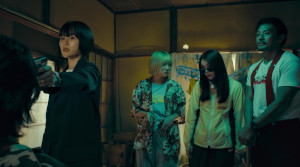
Of course, a few new characters have to be added in order to expand the story a bit. Which are the two "mentors", and Chisato has problems especially with Iruka, as the latter simply can't get used to Chisato's youthfulness and lightheartedness because it seems as if she was avoiding taking responsibility. You get the impression that the story wants to focus on confronting the two girls with growing up, not least because Mahiro is turning twenty. The "Baby Assassins" series mostly lives off the lighthearted and unspectacular way the two girls spend their everyday lives but letting them grow up a little makes perfect sense in the third installment. This also means that we get less of those typical scenes in which the two are just chatting about pointless stuff, which makes you feel like everything was just improvised by the actresses. And that's a good thing because those scenes were rarely able to convince me. They are often supposed to be funny, but instead they just fizzle out.
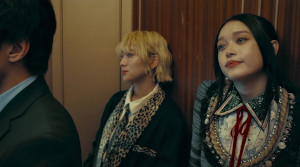
In "Nice Days" there are even a few more emotional moments that work quite well. Especially the epilogue, which contained mellow chitchat in the other movies, is able to be convincing this time. The two girls know what they have in life and of each other, and that neither should be taken for granted. The acting of the two, including some tears being shed while having a smile on their face, show that the two actresses have also become better in their roles. Nevertheless, there is still the question of what the two killers actually have as a life goal. Taking each day as it comes is of course still suitable for their age, but at some point, they will have to ask themselves existential questions. Having more sophisticated characters could be nice, and in order to do that you would not have to completely abandon the slapstick-like humor, which is based on the unworldliness and lightheartedness of the two young girls. A little more depth wouldn't hurt the two, and we also get a brief glimpse of what that could look like in a conversation between the rival killer and Mahiro. The way things are in "Nice Days", there is hardly any reason to feel sorry for the two girls - they are still two merciless killers.

While the story only provides the bare minimum, most of the work falls on the interaction between the characters. This works quite well, but in the end, it doesn't prevent the movie from having its longueurs in the middle. However, this is bearable, as the action is nicely spread across the movie. Right at the beginning there is an encounter that would easily pass off as a finale in other movies. But the showdown in "Nice Days" even takes things up a notch. There are also nicely composed shootouts, in which bullets are dodged as realistically as possible. The special thing about those moments is not only the aesthetics and elegance of those scenes while they rigorously and brutally whirl across the screen, but also the fact that pretty long sequences were shot without any cuts. The extent of preparation and perfection that goes into something like this is always visible. Akari Takaishi, in particular, seems to have come a long way since the last installment, because her action scenes feel much more natural and also more hard-hitting.


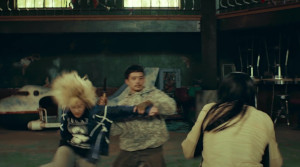

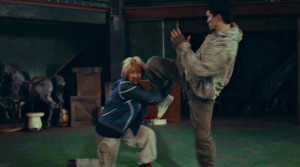
The star of the movie, however, is still Saori Izawa, who really comes to life in the choreography by Kensuke Sonomura. And Sosuke Ikematsu ("Killing") is a perfect match as an opponent too. In their fights, the two look as if they are improvising a lot, they only escape blows by the skin of their teeth, and while grappling the slender heroine's desperation and concentration is really palpable, hits also always have realistic effects. And since everyone knows their craft so well, there is no quick editing or camera shaking - everything is captured perfectly, and most fights don't even use background music. Nothing is supposed to distract from the wonderful action. Kensuke Sonomura's fights have their very own special style and simply have to delight action fans. In the end, it's once again the action that gets "Nice Days" a recommendation. By the way, there is a miniseries in Japan called "Baby Assassins - Everyday!", also produced in 2024, the first episode of which could briefly be watched on YouTube. Maybe this format is even better suited to eradicate the story's weaknesses and avoid fatigue setting in when it comes to the shallow comedy. Anyway, "Nice Days" seems more rounded than its predecessor, especially thanks to its ending, and the somewhat rarer comedy breaks underline once again what has been the real strength of the series so far: breathtaking action.

Disclaimer










